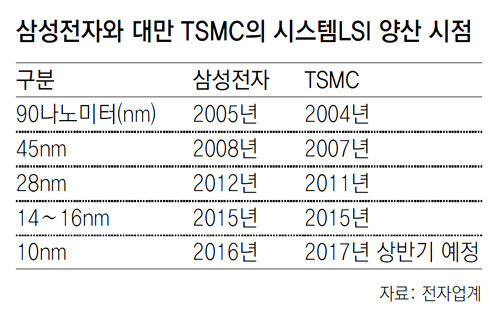Samsung starts mass production of world's first 10 nano process
Samsung starts mass production of world's first 10 nano process
Posted October. 18, 2016 07:27,
Updated October. 18, 2016 07:39

Samsung started mass production of 14 nano process in January last year for the first time in the mobile application processor industry.
This time, the first generation process of 10 nano has improved performance by 27 percent compared with the existing 14 nano process. Consumption power has been reduced by 40 percent, but the amount of chip produced per wafer has been increased by 30 percent.
Since last year, the Korean tech giant has been widening gap in mobile AP foundry with rivals thanks to its high technological power, which led to its first commercialization of 14 nano process in the world. Samsung has been continuing competition with Taiwan's TSMC, the biggest rival in foundries, over the past decade. Industry sources say that TSMC, which is mass producing 16 nano process, will be able to mass produce 10 nano process as early as within this year, setting a stage for a fiercer competition among the two rivals.
"TSMC, which is in a position of having to catch up with Samsung that mass produced 14 nano first, has to compete by calculating that Samsung will step ahead in competition," an electronics industry source said. "In this regard, it could have decided that it is not meaningful to focus on 10 nano technology."
According to the electronics industry sources, TSMC signed an exclusive foundry deal with Apple on iPhone 8's AP "A11." Samsung is known to have signed a deal with Qualcomm for its next generation mobile AP.
김지현기자 jhk85@donga.com







